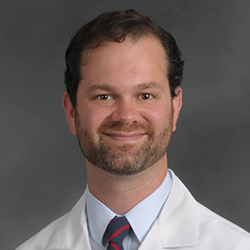As a fellowship-trained spine surgeon specializing in complex spine conditions and spinal deformities, Harry Mushlin, MD, is helping Stony Brook Neurosurgery Spine Center move the needle on the treatment of challenging spine disease.

Dr. Mushlin is dedicated to improving his patients’ lives through the diagnosis and treatment of chronic or complicated spine disease. As the Director of Complex Spinal and Deformity Surgery and Assistant Professor of Neurosurgery at Stony Brook Neurosurgery Spine Surgery, Dr. Mushlin treats a wide range of conditions, including spinal stenosis, degenerative disk disease, tumors, trauma, scoliosis, and other deformities and diseases.
“The most rewarding part of what I do is improving a person’s quality of life,” Dr. Mushlin says. “I form a relationship with my patients and work with them to develop a therapeutic plan that aligns with the patient’s and doctor’s goals. This balance is a critical part of my practice.”
Meet Dr. Mushlin
After receiving his Bachelor of Science in cognitive neuroscience from The George Washington University, Harry Mushlin, MD, Director of Complex Spinal and Deformity Surgery and Assistant Professor of Neurosurgery at Stony Brook Neurosurgery Spine Surgery, went on to graduate from New York University School of Medicine. He completed his neurosurgery residency at University of Maryland Medical Center in 2020. Dr. Mushlin then became a clinical instructor and fellow in complex spine and neurotrauma at the University of Pittsburgh Medical Center before joining the team at Stony Brook Medicine in August 2021.
Dr. Mushlin is passionate about helping patients and their families get through unexpected and devastating spinal injuries, as well as delivering compassionate, personalized care using the latest technology. During his residency and fellowship, Dr. Mushlin’s research focused on spinal cord injury and improving outcomes for patients with traumatic spinal cord injuries. His research has appeared in multiple journals, including World Neurosurgery, Journal of Neurosurgery, Spine, The Spine Journal and Journal of Neurotrauma. Dr. Mushlin continues to analyze the ways in which less invasive procedures can yield fewer complications and better results when treating complex spine disease and traumatic injuries.
Minimally Invasive Spine Surgery
During his fellowship training in complex spine surgery and neurotrauma, Dr. Mushlin focused on the latest minimally invasive techniques for complicated surgeries. He now uses these methods whenever possible at Stony Brook.
“I perform surgery for patients who have complex radiographic findings, including revision surgery, as well as procedures for severe degenerative conditions and deformities,” Dr. Mushlin says. “I use minimally invasive techniques when possible, either for the whole procedure or a part of the procedure.”
In traditional open spine surgeries, the surgeon must make a large incision, retract the muscle, and expose the bone. While this helps the surgeon get a clear view of the surgical area, it affects a larger area than necessary to solve the problem. Retraction can damage not only the muscle, but also the surrounding soft tissues, creating new pain and a lengthier recovery period. The chance for infection is also greater.
With minimally invasive procedures, the surgeon can access surgical corridors through small incisions, preserving muscle and other spinal structures and lowering the risk for complications. Minimally invasive surgeries that Dr. Mushlin performs include decompression procedures for spinal stenosis, percutaneous screw fixation and scoliosis surgeries, which can be done through the anterior, posterior or lateral aspect of the spine. Minimally invasive approaches allow the surgeon to avoid cutting through muscle. However, not all patients are candidates for minimally invasive procedures.
“The patient’s anatomy has to be favorable to allow for a minimally invasive procedure,” Dr. Mushlin says. “Certain pathologies can be treated this way, either as an adjuvant to the whole therapy or as the primary treatment.”
When minimally invasive procedures are a viable option, they offer a host of benefits to the patient.
“There is less operative blood loss and less postoperative pain,” Dr. Mushlin says. “Patients are in the hospital for a shorter amount of time, recover faster and have improved outcomes compared with open surgery. We reach the same goals faster, allowing patients to have a better quality of life sooner.”
A Community Resource for Referring Physicians
Whether patients require surgery or other types of treatment, Dr. Mushlin and his colleagues at Stony Brook welcome patients with all types of spinal conditions, from straightforward cases to those complicated by a history of difficult diagnoses or multiple spinal surgeries. As an academic medical center, Stony Brook offers leading-edge treatment options as part of the trifold mission of patient care, medical education and scientific research.
“We are here to see any spinal patient in any condition,” Dr. Mushlin says. “We want to be a resource to the community for all conditions related to the spine. We offer a wider range of advanced techniques and treatments, and we encourage referring physicians to trust their patients to our care.”
Dr. Mushlin is also committed to remaining accessible both to physicians and patients.
“I’m open to discussions about all patients,” he says. “I’m here to be a resource to help figure things out and develop an appropriate treatment plan for every patient. Spine surgery done right truly change’s people’s lives, and that’s why I do what I do.”
Stony Brook makes it easy for patients with many facilities to access spine care so they can receive treatment close to home. Dr. Mushlin sees patients at Stony Brook Neurosurgery Spine Center’s three convenient Long Island locations, in Commack (500 Commack Road, Suite 201, Commack, New York 11725), East Setauket (24 Research Way, Suite 200, East Setauket, NY 11733) and Riverhead (54 Commerce Drive, Suite 7, Riverhead, NY 11901).
To learn more, visit neuro.stonybrookmedicine.edu/centers/spine/harry-mushlin.
Source: MD News April 2022, Long Island Edition
